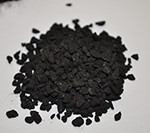May 6 2015
QuantumSphere, Inc. (QSI), today announced commercial validation of its proprietary nano iron catalyst (Product Name: FeNIX™) in a production-scale ammonia plant in China. QSI is a leader in nanoscale catalyst technology used to increase production efficiency in multi-billion dollar industrial chemical processes.
 Nano FeNIX™ coated commercial iron catalysts for ammonia synthesis. (Photo: Business Wire)
Nano FeNIX™ coated commercial iron catalysts for ammonia synthesis. (Photo: Business Wire)
Working closely with a leading Chinese industrial chemicals partner, 23 metric tons of standard ammonia catalysts were coated with 360 kilograms of FeNIX nano catalysts and loaded into multiple catalyst beds. Initial validation results from a 40,000 metric ton per year plant demonstrated a 10-15 percent increase in ammonia output, with no plant modifications. Higher catalytic activity and improved efficiency are due to the crystalline structure and extremely high surface area of the FeNIX nano catalysts. An increase of 5 percent in ammonia production can translate into millions of dollars of additional revenue annually in a typical-sized ammonia plant.
This validation represents a significant development in the global ammonia industry. Nearly $100 billion USD worth of ammonia is produced annually, consuming 1-2 percent of the world’s energy supply. Additionally, more than 80 percent of ammonia output is used as agricultural fertilizer for global food production, supplying 50 percent of all protein consumed by humans. China, the world’s largest ammonia producer, accounts for more than 30 percent of the global market.
Kevin Maloney, QSI’s President and CEO, commented, “The commercial validation of our FeNIX nano catalyst product in the largest ammonia market in the world is an important milestone for QSI. It is the result of an open and collaborative effort with key market leaders in China and Europe.”
Based on the validation results, QSI’s proprietary FeNIX nano catalysts have the potential to significantly improve the efficacy of the 100-year-old Haber-Bosch process and deliver substantial additional revenue and profits for ammonia plant operators worldwide. Ammonia producers can benefit from the technology’s ability to create higher chemical reaction activity rates at lower temperatures and pressures, thus increasing overall conversion efficiency and production output.
“Our FeNIX nano catalyst is just the first of many disruptive products we plan to bring to market. QSI will continue to develop and commercialize additional nanoscale catalysts for other high-value chemical processes,” Mr. Maloney added. Beyond the focus of ammonia production, QSI has nanoscale catalysts in the development and lab validation phases for methanol and Gas to Olefins (GTO) processes.
Background
The Haber-Bosch process combines nitrogen with hydrogen, under high temperature and pressure, to make ammonia. With a global capacity approaching 250 million metric tons by 2018, more than 80 percent of the ammonia produced annually is used as agricultural fertilizers to grow food crops. As a result, the Haber-Bosch process has often times been called one of the most important inventions of the 20th century, feeding and driving the world's population from 1.6 billion in 1900 to almost 8 billion today. QSI’s FeNIX nano iron catalyst increases the active surface area of the standard commercial iron catalysts and lowers the reaction temperature and pressure needed for the Haber-Bosch process to occur, increasing overall conversion efficiency and output. FeNIX catalyst performance improvements may vary based on the type of commercial catalyst utilized, ammonia reactor size, and plant operating conditions.
A multi-billion dollar global industry, catalysts are essential to the world’s industrial production. As much as 90 percent of all chemical processes utilize catalysts (petroleum refining, pollution abatement, and production of fuels and chemicals) and 60 percent of all consumer and industrial products (fertilizers, plastics, pharmaceuticals, and batteries) are made using catalysts. The global market for catalysts is $16.3 billion USD and demand is expected to increase to $20.6 billion USD by 2018 (World Catalysts Report: December, 2014, The Freedonia Group).
Catalysts are seen as a preferred way to improve process efficiency, lower costs, increase output, use less energy, and meet both performance and environmental standards. This places a strong emphasis on the development of new catalysts with higher activity, increased longevity, and reduced environmental and/or health impact.
Nanocatalysts are nanoscale materials (typically under 100 nanometers in size) that have been subjected to nanoscale structural modification in order to enhance their catalytic activity by increasing the active surface area, resulting in unique physical properties with superior performance. A nanometer (nm) is one billionth of a meter, or 1000 times smaller than the diameter of a human hair, or roughly the size of a marble when compared to the earth. QSI’s advanced catalysts typically measure less than 50 nanometers in size.
Source: http://qsinano.com/